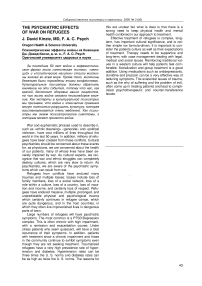Психиатрические эффекты войны на беженцев
Автор: Кинзи дЖ. дэвид
Журнал: Сибирский вестник психиатрии и наркологии @svpin
Рубрика: Тезисы докладов международной конференции по психоонкологии "Культура, мозг, тело"
Статья в выпуске: 3 (50), 2008 года.
Бесплатный доступ
За последние 50 лет война и эвфемистические фразы типа «этническая чистка», «геноцид» и «политическое насилие» стоили миллионы жизней во всем мире. Кроме того, миллионы беженцев были порождены этими конфликтами. Культуральные психиатры должны обратить внимание на эти события, потому что нас, как врачей, беспокоит здоровье наших пациентов, на чью жизнь война оказала неизгладимое влияние. Как эксперты в культуральной психиатрии мы признаем, что война и этнические сражения могут полностью разрушить культуру, которая восстанавливается очень медленно. Как психиатры мы знаем психиатрические симптомы, к которым может привести война.
Короткий адрес: https://sciup.org/142100749
IDR: 142100749
Текст статьи Психиатрические эффекты войны на беженцев
War and euphemistic phrases used to describe it, such as «ethnic cleansing» «genocide» and «political violence» have cost millions of lives throughout the world in the last 50 years. In addition, millions of refugees have been created from these conflicts. Cultural psychiatrists should be concerned about these events for, as physicians, we are concerned about the health of our patients, many of whose lives have been severely impaired by war. As cultural experts, we recognize that war and ethnic struggles can completely destroy cultures, which are very slow to return. As psychiatrists, we are aware of the psychiatric symptoms which can result from war.
Refugees from conflicts have endured many traumas and multiple losses; losses include loss of family members, loss of a social network, loss of a role within a culture, loss of a country, loss of vocation and income, and certainly loss of respect. Refugees have endured massive, multiple, prolonged, and unpredictable physical and psychological trauma which certainly continues in refugee camps, which are quite dangerous, and in the host countries, in which they often live impoverished lives in dangerous parts of town.
Large numbers of refugees will have psychiatric symptoms. The most common is a PTSD/Depression complex. This is often chronic with high impairment, with a remission and exacerbation course. Under stress patients who seem quiescent, will have a total recurrence of their symptoms. In addition, patients with treatment show a chronic impairment and those in the community continue to exhibit symptoms even though they are not seeking treatment. Traumatized refugees have a very high prevalence rate of hypertension and diabetes. Hypertension rates can be three times the U. S. norms and diabetes rates can be as high as twice the U. S. norms. The reasons for this are unclear but what is clear is that there is a strong need to keep physical health and mental health combined in our approach to treatment.
Effective treatment of refugees is complex, longterm, has important cultural significance, and is neither simple nor formula-driven. It is important to consider the patients culture as well as their expectations of treatment. Therapy needs to be supportive and long-term, with case management dealing with legal, medical and social issues. Reinforcing traditional values in a western culture will help patients feel comfortable. Socialization and group treatment is a good addition. Using medications such as antidepressants, clonidine and prazosin can be a very effective way of reducing symptoms. The existential issues of trauma, such as the why of suffering and the problem of evil, often come up in treating patients and lead to complicated psychotherapeutic and counter-transference issues.


